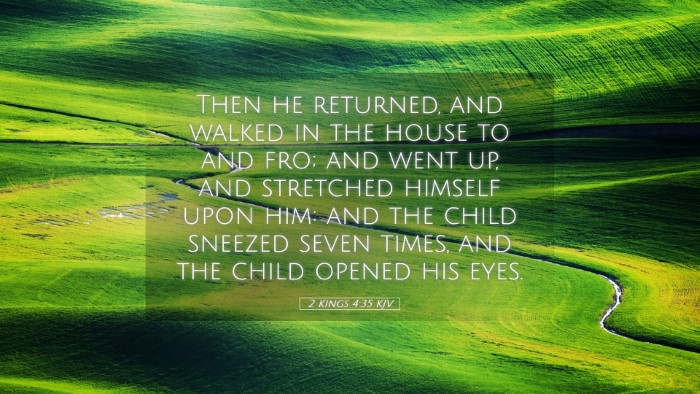Commentary on 2 Kings 4:35
Bible Verse: 2 Kings 4:35 - "Then he returned and walked in the house once to and fro; and went up, and stretched himself upon him: and the child sneezed seven times, and the child opened his eyes."
Contextual Overview
This verse occurs within the narrative of Elisha's ministry, emphasizing the prophet's role as a vessel of God's power for miracles. The account centers around a woman from Shunem, who, having shown hospitality to Elisha, is blessed with a son. Tragically, the child dies, leading the mother to seek out Elisha.
Elisha's actions, culminating in this specific moment, showcase divine intervention and raise profound theological implications regarding faith, healing, and resurrection.
Analysis of the Actions
Elisha engages in a series of actions that are highly symbolic and illustrative of prophetic ministry. He does not take immediate action, but instead walks through the house, deliberating on the situation.
-
Walking to and fro: This may signify a moment of deep contemplation, prayer, and a connection with God, as seen in the commentaries of Matthew Henry, where he notes that this symbolizes the weight of the issue at hand.
-
Stretching himself upon the child: This act represents a physical connection, indicating that the life of the prophet merged with that of the child, an echo of the Biblical theme where life is transmitted through touch (as seen similarly in other miracle accounts).
Significance of the Number Seven
The child sneezing seven times holds significant meaning. In the ancient Near Eastern context, the number seven symbolizes completion or divine perfection. According to Albert Barnes, the act of sneezing can imply a revival of spirit or the return of breath, signifying that life has been restored.
Seven Sneezes: This could also be seen as an indication of the totality of the miraculous event—a complete restoration of life, divinely orchestrated.
Theological Insights
Various commentators reflect upon the theological implications of this resurrection. Adam Clarke elucidates that this moment is not merely about the physical act of raising the child but encapsulates a deeper narrative regarding hope and resurrection through faith.
-
Faith of the Shunammite Woman: Her initial faith in Elisha's ability to help is critical to the narrative, illustrating the importance of faith in conjunction with divine power.
-
Symbol of Christ's Ministry: The act of raising the child can also be seen as a foreshadowing of Christ’s resurrection power, a recurring theme throughout the miracles and teachings found in the New Testament.
Lessons for Pastoral Ministry
For pastors and ministers, this passage provides multiple key insights:
-
The Role of Prayer: Elisha’s actions prior to the miracle demonstrate the importance of prayer and seeking God's will in every circumstance.
-
Compassionate Ministry: Elisha exemplifies the compassion that should characterize pastoral care—he does not rush but approaches the situation with care and reverence.
-
Empowerment through Faith: This account illustrates that faith is often the precursor to divine intervention—an encouragement for ministers to foster a community grounded in belief.
Conclusion
2 Kings 4:35 stands as a powerful testament to God's ability to bring life from death. The layered meanings in this passage, drawn from the insights of Matthew Henry, Albert Barnes, and Adam Clarke, affirm that the miracles of Elisha serve not only as demonstrations of power but also as profound lessons in faith, obedience, and the compassionate heart of God navigating the human experience.


